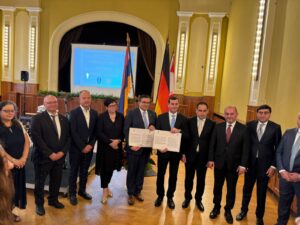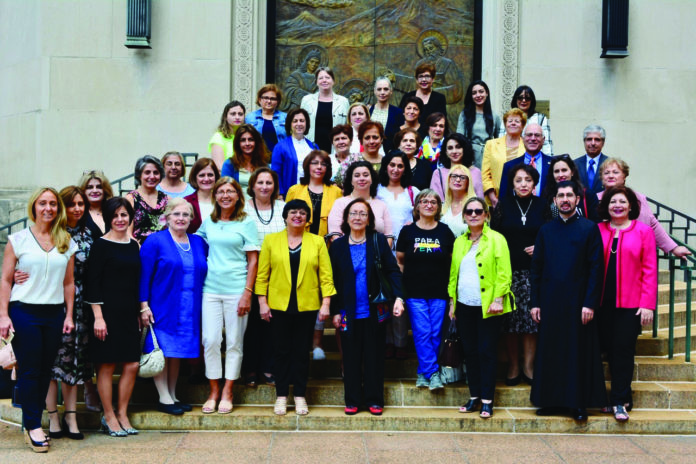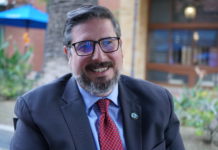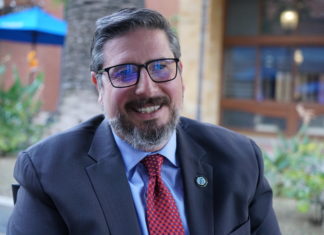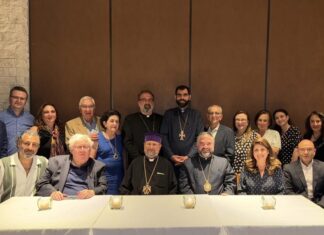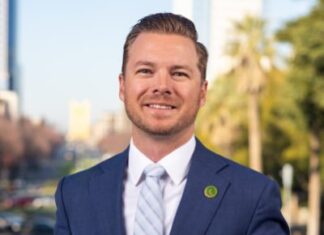NEW YORK — At the annual Armenian Teachers Symposium of the Eastern Diocese of the Armenian Church of America on September 7, various presentations and workshops were organized by the Diocesan Armenian Studies department, headed by Gilda Kupelian, to aid in the professional development of the 45 Armenian school educators present (see https://armenianchurch.us/2019/09/10/a-symposium-for-armenian-school-teachers/).
At this symposium, Fr. Davit Karamyan put forward some proposals concerning the future direction of Diocesan involvement in Armenian language instruction which could lead to radical changes in the role of the Diocese. He suggested that the work thus far had not led to much success and instead he suggested the creation ultimately of a joint entity including the Diocese, Prelacy and Armenian General Benevolent Union, with the support of the Education Ministry of the Republic of Armenia.
Karamyan urged the educators to reexamine their views, declaring in Armenian (all translation below is that of the author), “I feel that we, as teachers or educators, are not ready to look reality in the eyes. We know that speaking Armenian, Armenian culture, is very sensitive for all Armenians, especially for those Armenians who speak Armenian. All of us here are those kinds of Armenians. But being realistic, I think, is a good thing for our future. We are a little bit in the clouds, and when we fall from the clouds, we hurt a little. They call that a nose dive, no? Perhaps our nose touches the ground and blood comes out…Are we ready for that, do we have the courage for it?”
He asked what the goal of the Armenian schools are under the present circumstances. Karamyan said that in his nearly ten years of experience working with youth, at each seventh-grade graduating event he has witnessed, only two or three children out of fifty could put together two decent sentences in Armenian, and these are children from Armenian-speaking families. Their speeches are practically the replication of the words of the previous class, with only the names changed, and are read from transliterated notes, written in English letters. Consequently, their teachers, he said, are “defeated” teachers who cannot have any satisfaction in success.
He continued, “So, I think the time has come for us, as a collectivity of teachers, to look at the reality and take realistic decisions.” He said that the Armenian Church at present “does not have sufficient ability to secure the right program and the best trained teachers.”
Karamyan said that as a priest, he recognized that the language issue was “the burden of centuries” on the church and added his personal point of view. He said that he does work to keep his people Armenian. However, he said, “I do this naturally because I am Armenian and my people are Armenian, but I have taken an oath to be responsible for the souls of the Armenian people in front of God. Now, when I add to my responsibilities, I deviate a little from my true responsibilities, or at least I am not able to do my responsibility fully. We as a people have become accustomed to this system. It has come to us over the centuries. But now we have statehood. Why do we not value that statehood? Why do we not allow the Education Ministry [of the Republic of Armenia] to truly educate? Why do we not let the Armenian Church truly take care of the Armenian soul and not be occupied with Armenian schools. This is the perfect picture, which I dream and pray truly that we will have. However, since we do not have it, the Armenian Church is the responsible one for all these things, it must try to use its strength in the best way, which is you. Again, this is not a perfect picture, when a child who has graduated the seventh grade must read his final words in Armenian written in English letters. This is the picture practically everywhere.”
He later in the question and answer session clarified that all this did not mean that the Armenian Saturday schools of the Diocese will be closed soon. While there was some discussion that the results of the Armenian Studies department were not sufficient, he said that other formats were being looked at, and added, “But it is very clear that you cannot change something without having something else in its place.”
